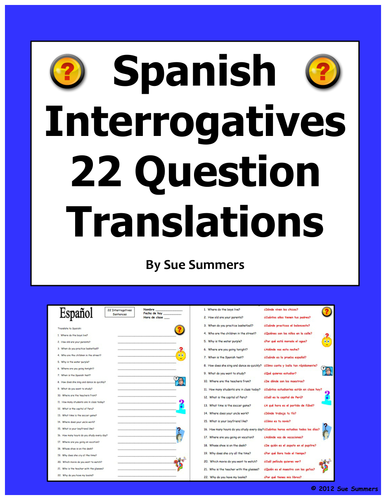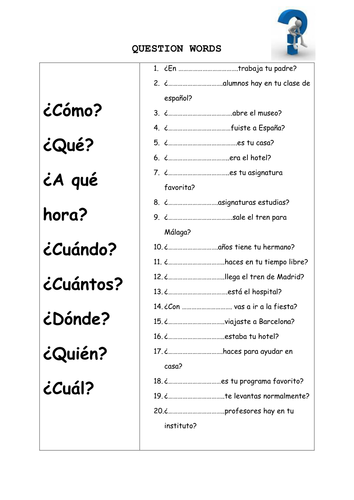
For example Por qué le pegaste or Why did you hit himher Para qué lo hiciste or What did you do it for. A noun is a word referring to a person animal place thing feeling or idea eg.

For example Por qué le pegaste or Why did you hit himher Para qué lo hiciste or What did you do it for.
Interrogative words in spanish. Learn List of Spanish interrogatives. Take advantage of our easy to use chart to learn 25 Spanish vocabulary words. Study online or print them out and take them with you.
List of Spanish question words or interrogative words What. One person - Quién. More than one person - Quiénes.
- for more. The Spanish Interrogatives quién quiénes who whom Quién es tu amiga. Who is your friend Quién es.
Who is it A quiénes conociste. Qué what The phrases por qué and para qué are usually translated as why Por qué is more common than para qué. Dónde where Dónde está.
Cuál this is not qué because there are potential answers that you are choosing from Cuándo Dónde Cómo Por qué Quién Cuál Cuándo Cuál Dónde Cómo Qué. Learn interrogative words in Spanish. The who what where why when and how in Spanish.
Some question words can also form question phrases with nouns. Qué auto es tuyo. What car is yours Cuántos años tienes.
How old are you. Literally how many years do you have Unlike yes or no questions open questions do sometimes require an inversion in their word order. The question word or phrase is always followed by the verb.
When the subject is not represented by the question word it is added right after the verb. There are three Spanish interrogative pronouns that can be translated to the English word what. Qué cuál and cómo.
Unfortunately they are not just interchangeable but there are some simple rules to govern their usage. In Spanish the interrogative adjectives are qué meaning which or what and cuánto cuánta cuántos cuántas meaning how muchhow many. Note that like all other Spanish question words qué and cuánto have accents on them.
Or what doesnt change for the feminine and plural forms. 8Por qué Para qué. For example Por qué le pegaste or Why did you hit himher Para qué lo hiciste or What did you do it for.
Or Why did you do it. Interrogative pronouns - Easy Learning Grammar Spanish What is an interrogative pronoun. In English an interrogative pronoun is one of the words who which whose whom and what when they are used without a noun to ask questions.
These are the interrogative pronouns in Spanish. Adjetivos interrogativos Qué cuál and cuánto are Spanish interrogative adjectives. An adjective is a word that modifies a noun and interrogative means questioning so interrogative adjectives are adjectives used to ask the questions what which and how muchmany Note that all of these words have accents.
Our next interrogative is the word what This ones so commonly used in the English language that translating it into Spanish can get a bit tricky. It gets a little bit difficult because there are two different Spanish words that are appropriate equivalents of what. Spanish Grammar Welcome to our grammar lesson about Spanish Question Words.
Question Words also called Interrogative Words are words we use to start a question indicating the type of information we are asking for. They are equivalent to the English words What. In Spanish asking a question that can be answered sí or no is extremely easy.
In written Spanish all you have to do is frame what you want to ask with question marks. In spoken Spanish you simply raise the pitch of your voice at the end of the question. Get our FREE 7-day email course on how to learn Spanish faster than you thought possible Shortcut to Conversational.
Learn about interrogative 1 in Spanish using our interactive multimedia Drag-n-Match quiz. Simply drag the Spanish word to the matching English and image. Spanish interrogative pronouns can be difficult for Spanish language learners.
A pronoun is a word that replaces a noun and interrogative means questioning so interrogative pronouns are pronouns used to ask the questions who what which how muchmany and where. Quién qué cuál cuánto and dónde are Spanish interrogative pronouns. The interrogative clause can be formed by inflection in Spanish.
En español las oraciones interrogativas se pueden formar mediante entonación. A noun is a word referring to a person animal place thing feeling or idea eg.